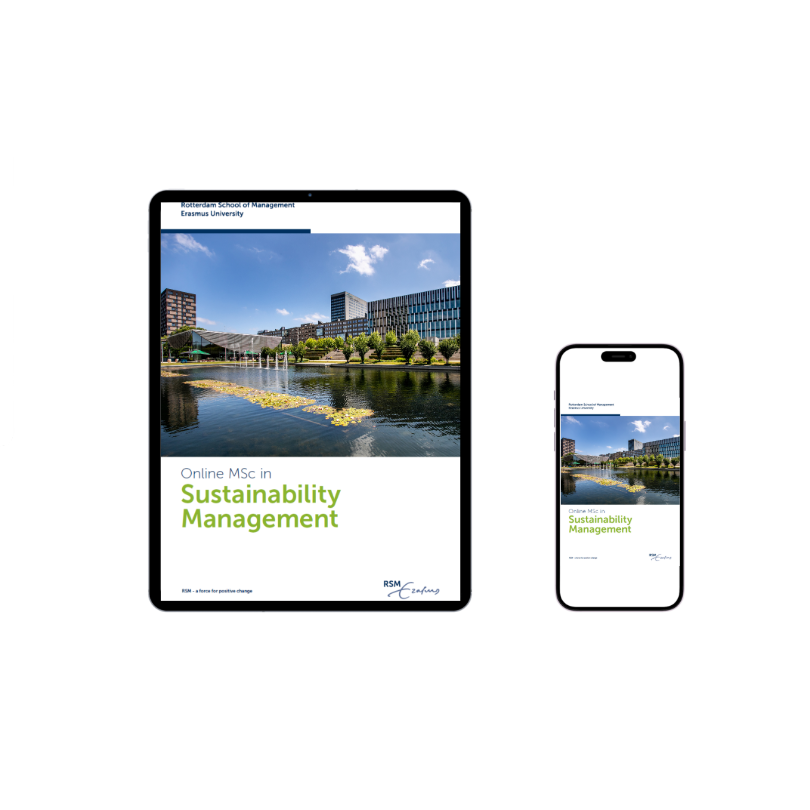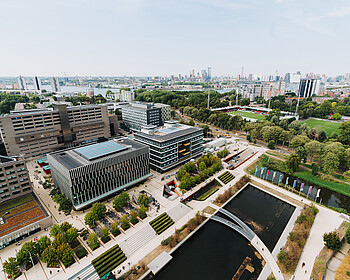The online MSc Sustainability Management is a two-year programme consisting of six courses. You will study theoretical foundations of sustainability management, which will then be applied to solve real-world problems and obstacles.
At the end of your study, you will have to complete your final project, where you will apply the knowledge you gained during the programme to overcome a real challenge than an organisation is facing.
Year 1
Your programme starts by building a platform for your learning journey and laying the foundations for impactful management.
Coursework includes:
- Learning the principles of sustainability.
- Exploring different worldviews of sustainable development and how those views may generate differentiated approaches and actions.
- Analysing the current approaches of companies.
- Evaluating how firms can use a systems perspective and innovation process to build business solutions that enhance the health of social-ecological systems.
In the second course, you step into the role of a sustainability manager.
This course focuses on:
- Sustainability strategies that help to drive environmental and social impact within companies.
- The key frameworks of sustainability management.
- Practical tools and case studies that empower you to integrate sustainable practices into business operations.
In your third course, you explore the question: Why are some companies more sustainable than others?
Coursework includes:
- Analysing governance mechanisms that shape corporate sustainability.
- Exploring the impact of internal governance mechanisms, such as top management teams, boards of directors, and shareholders.
- Evaluating external governance mechanisms, such as ESG rating agencies, the media, social activists, and regulators.
In the fourth course, you examine responsibility and ethics as pillars of sustainability.
You are stimulated to:
- Develop the capabilities you need to help you avoid moral blind spots.
- Internalise and embrace ethical behaviour in your daily work practices.
- Lead other stakeholders within and beyond organisational boundaries to work towards sustainability objectives.
Year 2
The fifth course investigates the complexity of tackling social issues.
You learn how to:
- Critically appraise potential solutions to social issues from various perspectives.
- Explore why issues such as labour conditions, inequality or global migration are so difficult to tackle.
- Reflect on the insights from the previous courses to examine the complexity, scale and scope of these issues, and why current solutions often fail.
In the sixth course, you explore how business activities drive major environmental issues, including:
- Climate change
- Biodiversity loss
- Freshwater scarcity
- Habitat destruction
- Pollution
- Overexploitation
For these issues, you further analyse the causes and impact, examine case studies to understand corporate responsibilities, risks, and strategies, and identify practical ways to address the challenges.
Your final project in the online MSc takes place in the last semester, around 16 weeks after you start, in which you are required to analyse a partner company’s sustainability approach and to draw on insights from all the six courses.
For this project, you collect data, critically analyse the company’s actions and write a detailed report. Additionally, you must demonstrate how you collaborated with a company contact and an RSM supervisor.
What career development advantages do you gain by choosing this MSc?
- More mobility in the Sustainability field.
- Potential promotion to a senior management role.
- Can integrate sustainable practices into core business strategies.
- Updated and deepened knowledge of global sustainability standards and practices.
- Can advise on sustainable development and environmental compliance in a consulting role.
- Enhanced expertise in sustainable management practices.
- Become a thought leader in the field of sustainability.
Knowledge
Learn how to:
- Analyse business sustainability from various perspectives.
- Determine how business is implicated in regard to sustainability issues.
- Evaluate the opportunities and risks that sustainability issues create for businesses and organisations.
- Consider the almost limitless ways in which organisations can become more sustainable.
Skills
Become confident in:
- Planning effective corporate responses to sustainability issues.
- Effectively and confidently communicating your sustainability initiatives to stakeholders.
- Advanced problem-solving, communication and collaboration.
Analytic ability
Gain hands-on experience in:
- Gain hands-on experience in:
- Using data to develop solutions.
- Critically assessing whether sustainability initiatives produce the intended effects.
RSM’s online master programme modules are taught by experienced faculty members who are both experts in their fields and active researchers in the field of sustainability management. Get to know some of them here.



At RSM we believe that sustainability is critical to business and leadership. We are fully committed to developing responsible and integrative thinkers and decision-makers, who understand their impact on people, organisations, society and the planet.
Our vision for this online master programme – to speed up the transition to a more sustainable economy through management education – is fully aligned with the spirit of Erasmus University’s mission to create positive social impact. And this vision follows the principles laid out in our education strategy, to provide education through the development of leaders for the sustainable digital economy, thereby acknowledging our mission to be a force for positive change in the world.
Every programme that we offer has an innovative approach that helps you to use your new knowledge to become one with RSM’s mission. This is especially true for the online MSc in Sustainability Management. When you graduate, you will know how to use a range of analytical strategies and applied solutions to deal with the responsibilities of corporations and businesses in times of global economic, social and environmental challenges.











